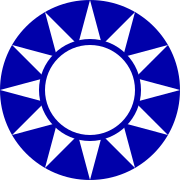
Back Societat de les Camises Blaves Catalan Blauhemden-Gesellschaft German Sociedad de Camisas Azules Spanish Chemises bleues (Chine) French Kelompok Baju Biru ID Società delle Camicie Azzurre Italian 藍衣社 Japanese 남의사 Korean Sociedade dos Camisas Azuis Portuguese Общество голубых рубашек Russian
Society of Practice of the Three Principles of the People 三民主義力行社 Sānmínzhǔyì lìxíng shè | |
|---|---|
 | |
| Ideology | Chinese ultranationalism[a] Three Principles of the People Anti-communism Anti-imperialism[2] Pro-Chiang Kai-shek |
| Colours | Blue |
| Part of | Kuomintang |
| Blue Shirts Society | |||||||||||
|---|---|---|---|---|---|---|---|---|---|---|---|
| Traditional Chinese | 藍衣社 | ||||||||||
| Simplified Chinese | 蓝衣社 | ||||||||||
| |||||||||||
| Part of a series on |
| Conservatism in China |
|---|
  |
The Blue Shirts Society (BSS)(藍衣社), also known as the Society of Practice of the Three Principles of the People (Chinese: 三民主義力行社, commonly abbreviated as SPTPP), the Spirit Encouragement Society (勵志社, SES) and the China Reconstruction Society (中華復興社, CRS), was a secret ultranationalist faction in the Kuomintang inspired by German and Italian fascists.[3][4]
The rise and fall of the Blue Shirt Society was rapid, but obscure, and it was seldom mentioned again by either the KMT or the Chinese Communist Party after the establishment of the People's Republic of China and the following KMT retreat to Taiwan.
- ^ Cite error: The named reference
ultranationalistwas invoked but never defined (see the help page). - ^ Jay Taylor, ed. (2022). The Generalissimo: Chiang Kai-shek and the Struggle for Modern China, With a New Postscript. Harvard University Press. p. 104.
The Blue Shirts hated the fascist Japanese and were fiercely anti-imperialist—as, understandably, were most Chinese.
- ^ Wei, Ni (2003). "民族"想象与国家统制: 1929-1949年南京政府的文艺政策及文学运动 ["National" Imagination and State Control: The Nanjing Government's Literary Policy and Literary Movement, 1929-1949] (in Chinese (China)). Shanghai City: Shanghai Education Publishing Co. ISBN 978-7-5320-8663-4. Retrieved 2024-09-30.
- ^ Zhang, Qizhi; Chen, Zhenjiang; Jiang, Pei (2002). "Chapter 9: First Ten Years of the Nanjing National Government". 晚清民國史 [History of the Late Qing Dynasty and the Republic of China] (in Chinese (Taiwan)). Taipei, Taiwan: Wu-Nan Book Inc. ISBN 978-957-11-2898-6. Retrieved 2024-09-30.
Cite error: There are <ref group=lower-alpha> tags or {{efn}} templates on this page, but the references will not show without a {{reflist|group=lower-alpha}} template or {{notelist}} template (see the help page).